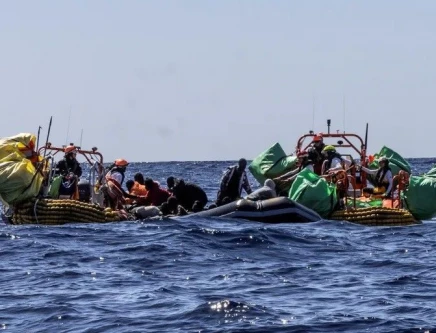At least 50 Sudanese refugees have died after a migrant boat caught fire and sank off the coast of eastern Libya, adding to the growing list of tragedies along one of the world’s deadliest migration routes. The International Organization for Migration (IOM) confirmed that the vessel, which was headed toward Greece, went down about 60 kilometers (37 miles) off the coast of Tobruk on Sunday. On Thursday, the UN migration agency said the boat had been carrying 75 refugees when the incident occurred, but only 24 survivors were rescued, leaving dozens unaccounted for.
The Libyan Red Crescent reported receiving an emergency call from Tobruk authorities shortly after the disaster, leading to the recovery of bodies at Kambot beach, 60 kilometers west of Tobruk, and in Qabes, some 90 kilometers to the east. However, it was unclear whether those victims were among the Sudanese passengers. The humanitarian group provided no further details, but officials fear the death toll could rise as more bodies are discovered in the coming days.
This is the latest in a string of deadly incidents involving migrants attempting the dangerous journey across the Mediterranean in hopes of reaching Europe. Just earlier this month, another migrant vessel capsized off the Libyan coast, leaving one person dead and at least 22 others missing, according to Libyan authorities. In December, 61 migrants, including women and children, drowned when their boat went down off western Libya, underlining the risks of overcrowded and unseaworthy vessels used in human smuggling networks.
The IOM’s Missing Migrants Project has recorded at least 434 migrants dead and another 611 missing in waters off Libya in the past eight months alone. These figures highlight the relentless toll of irregular migration through the North African nation, which has become a major departure point for people fleeing conflict, persecution, and economic despair in Africa and the Middle East. Sudanese refugees, in particular, have been among the most vulnerable, escaping the ongoing war and humanitarian crisis in their homeland only to face new dangers at sea.
Libya’s coast guard has frequently been criticized by aid groups for failing to protect migrants and, in some cases, endangering their lives. Earlier this year, humanitarian organizations reported incidents of the Libyan coast guard firing on NGO rescue vessels in the Mediterranean, raising concerns about migrant safety and the lack of accountability. Despite international outcry, Libya remains a hub for smugglers who exploit desperate refugees by cramming them into unsafe boats bound for Europe.
The worsening humanitarian crisis reflects broader instability in Libya, which has remained in turmoil since the NATO-backed uprising in 2011 that toppled and killed longtime ruler Moammar Gadhafi. The power vacuum left behind has fueled chaos, lawlessness, and the growth of trafficking networks that profit from irregular migration. For thousands of migrants, the country has become both a place of exploitation and a last resort transit point before attempting the treacherous Mediterranean crossing.
The sinking of the Sudanese refugee boat underscores the dire risks faced by those fleeing violence and poverty, as well as the urgent need for stronger international action to prevent further loss of life. As families in Sudan and across Africa mourn their loved ones, humanitarian agencies continue to warn that without safer legal pathways to migration, tragedies like the one off Tobruk will only keep repeating, leaving behind a trail of grief in both North Africa and Europe.













Leave a comment